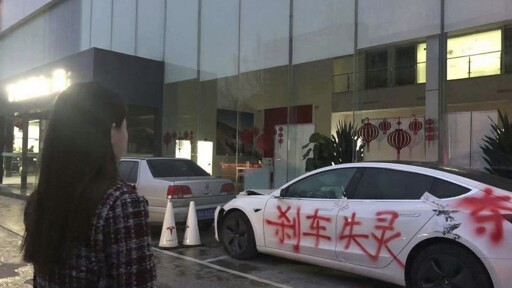Zhang Yazhou was sitting in the passenger seat of her Tesla Model 3 when she said she heard her father’s panicked voice: The brakes don’t work! Approaching a red light, her father swerved around two cars before plowing into an SUV and a sedan and crashing into a large concrete barrier.
Stunned, Zhang gazed at the deflating airbag in front of her. She could never have imagined what was to come: Tesla sued her for defamation for complaining publicly about the car’s brakes — and won. A Chinese court ordered Zhang to pay more than $23,000 in damages and publicly apologize to the $1.1 trillion company.
Zhang is not the only one to find herself in the crosshairs of Tesla, which is led by Elon Musk, among the richest men in the world and a self-described “ free speech absolutist.” Over the last four years, Tesla has sued at least six car owners in China who had sudden vehicle malfunctions, quality complaints or accidents they claimed were caused by mechanical failures.



Japan has similar laws curbing free speech. It comes down to the east asian concept concept of ‘face’.
In sociology, face refers to a class of behaviors and customs, associated with the morality, honor, and authority of an individual (or group of individuals), and their image within social groups. Face is linked to the dignity and prestige that a person enjoys in terms of their social relationships.
Japan’s defamation/libel laws, similar to this Tesla case China, don’t matter if what you said is true. What matters is that you disrespected the ‘face’ and reputation of those in power.
“(1) A person who defames another by alleging facts in public shall, regardless of whether such facts are true or false, be punished by imprisonment with or without work for not more than three (3) years or a fine of not more than 500,000 yen.”
For example, if a news agency reports on a rapist, or an individual puts up a bad review online: it doesn’t matter if it is true. The ‘victim’ sues you for libel/defamation for speaking the truth because you didn’t “give them face” and you hurt their public reputation. Expect the police to come knocking and ask you to remove your truthful reviews, or you risk jail time or civil penalties.
Edit:
I suspect the judicial system here is working exactly as intended. Its the laws in Japan/China that are fucked when it comes to free speech vs protecting the ‘face’ of those in power.
Truth is also not a defense for defamation in the UK, though the law was changed about a decade ago to limit the potential for abuse. The UK is a popular venue to sue for defamation because it gives the plaintiffs a relatively easy ride.
That is the stupidest fucking idea I have ever heard
In some Asian cultures, saving face is the most important thing in the world. Doesn’t matter if people die, as long as nobody important loses face.
There are other countries, not in East Asia, where that’s also true: for example, in Saudi Arabia and the Gulf monarchies. Reputation and respect for hierarchy is a big thing in old-school Arab culture, though in other parts of the Arab world such as Lebanon, there is a rich repertoire of invective and shit-talking that’d make a New York cabbie blush.
I stand by my original statement.
Agreed. I live in Japan and self censor what I say online, avoid leaving negative but truthful business reviews, because there is a very real risk of being sued for libel.
In your second link it contradicts what you say about it not mattering if it’s true, right below the section you quoted:
“If the act relates to matters of public interest and has been conducted solely for the benefit of the public, the truth or falsity of the alleged facts shall be examined, and punishment shall not be imposed if they are proven to be true. (See Article 230-2 of the Criminal Code). Article 32 of the Criminal Code provides for the Statute of Limitations for filing a criminal action for defamation which shall prescribe in ten (10) years.”
Yes, if you only consider the letter of the law. But the spirit of the law and the pro-business, pro-those-in-power courts rarely rule in the individual’s favor. The laws weren’t made for you the individual.
Don’t Get Sued! Libel, Slander, and Defamation Laws in Japan
More relevant discussion here about the concept of face.
edit: Key comment here:
“The law in Japan has a cultural and legal background in much older laws about “damage to honour”. Anything that damages someone’s social standing, regardless of whether a specific claim is being made, is not on and is liable to be considered defamatory. Further, the lack of a specific claim makes the “truth and public interest” bar much, much harder to meet since you can’t claim that your statement was truthful or in the public interest if there’s no specific claim the business or person can respond to. If you’re just being insulting you’re one a one-way trip to a legal spanking.”
I live in Japan and self censor what I say online, avoid leaving negative but truthful business reviews, because there is a very real risk of being sued for libel.